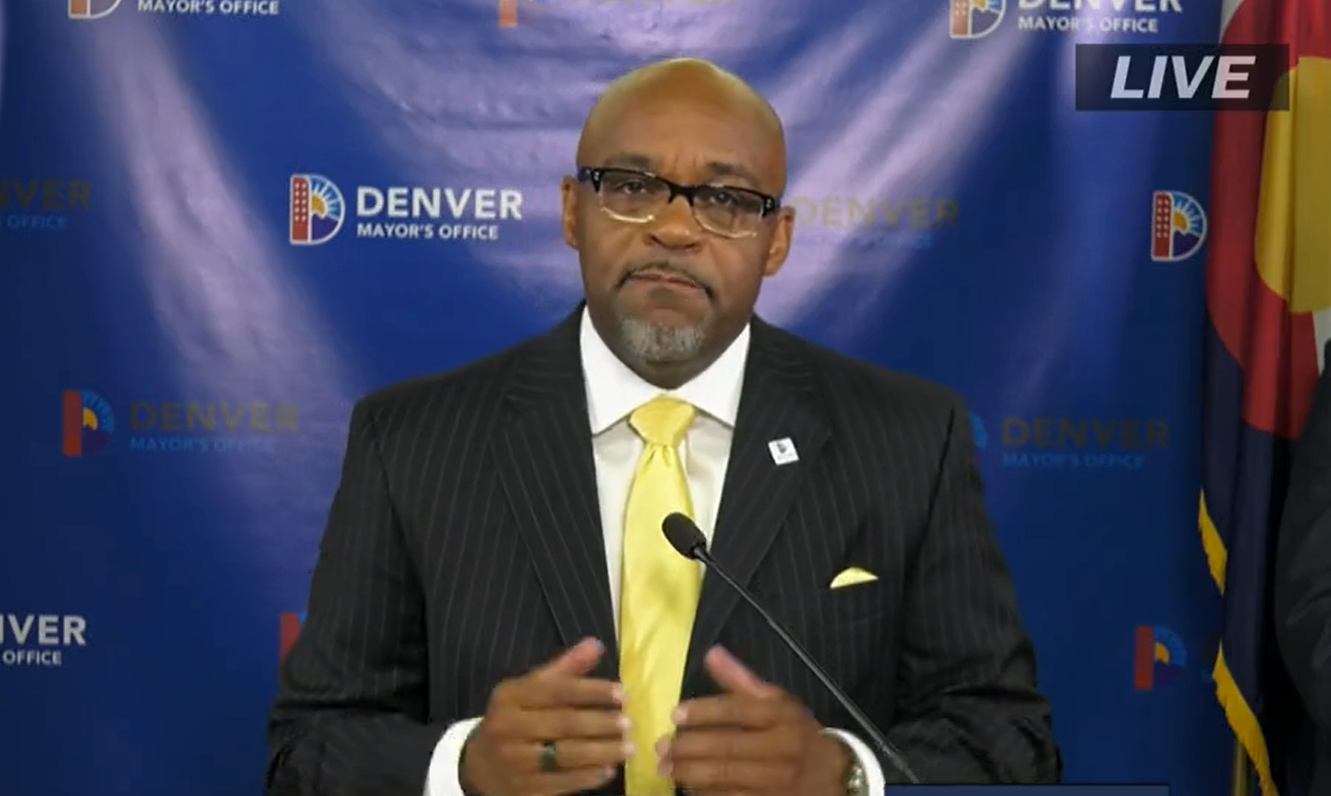
City and County of Denver

Audio By Carbonatix
On September 15, Mayor Michael Hancock unveiled a proposed $1.49 billion general fund budget for 2022, which falls in the range of the budget originally planned for 2020, before the COVID pandemic disrupted Denver’s economy.
“This $1.49 billion budget is an important component of our long-term financial plan to build a sustained and inclusive recovery. It is financially responsible, equitable, invests in our community, bolsters our local businesses, and serves as a critical force to rebuild our economy so it works for everyone,” Hancock said in announcing the budget.
As in past years, one of the biggest recipients of general fund money in the proposed budget is the Department of Public Safety, which houses the police, sheriff and fire departments, at $567.67 million.
The general fund comprises revenue generated by the city largely through taxes, such as the sales and use tax and property tax, as well as fees. When the general fund revenue is combined with other sources of funding that the city has available this year, such as money generated from special revenue funds, Denver anticipates a total operating budget of $2.6 billion for 2022, a 9 percent increase over the total operating budget in 2021.
The proposed $1.49 billion general fund budget for 2022 represents a 12 percent increase over the $1.33 billion general fund budget proposed by Hancock and approved by Denver City Council for 2021. The $1.485 billion general fund budget originally approved for 2020 wound up being cut back to $1.265 billion because of the pandemic.
Denver has assurances that it will receive a total of $308 million in American Rescue Plan Act funds from the federal government. So far, Denver has gotten a $154 million check, with the next half of the money coming in 2022.
The 2022 budget proposal seeks to earmark $6.3 million of the ARPA money “to support alternatives to shelter such as Safe Outdoor Spaces, Safe Outdoor Parking and tiny home villages, as well as increase the number of rapid rehousing/rapid resolution services for people experiencing homelessness,” according to a release from the mayor’s office.
In the budget proposal, Hancock’s office also suggests spending $190 million on affordable housing, housing stability and support for people experiencing homelessness.
Denver’s economy, while rebounding in key ways, still has some major issues.
For example, the lodger’s tax, which is generated from hotel stays, remains below 2019 numbers and will likely continue to remain lower simply because of decreased tourism, according to Brendan Hanlon, the city’s chief financial officer.
And while Denver has long been viewed as a city with solid employment rates, it’s now struggling in that category.
“For the first time, at least in my experience, Denver is actually trailing in terms of our unemployment rate relative to the state and national unemployment rates,” Hanlon said during a call with reporters after the budget was released. While July 2021 figures showed the national unemployment rate at 5.4 percent, Colorado’s was at 6.1 percent, and Denver’s at 6.5 percent.
“A contributing factor to Denver County’s higher unemployment rate involved the higher concentration of the leisure and hospitality sector in Denver County, a sector that was particularly hard-hit by the pandemic. For 2022, we are assuming employment continues to experience slack through the first part of the year but begins to ramp up at the onset of summer as the public health situation moderates and as seasonal hiring resumes to closer to pre-pandemic rates. Full employment levels are expected as we move through the fourth quarter of the year,” the 2022 budget proposal states.
Other highlights of the budget proposal include increased funding for the Support Team Assisted Response (STAR) program, which staffs a non-law enforcement mobile truck with a paramedic and social worker who assist people in crisis on the streets of Denver; $10 million for updates to the Central Library, a little over half of the $19 million that the Denver Public Library needs to complete that planned renovation; and $3.5 million in capital expenditures for restoration of the Civilian Conservation Corps camp at Red Rocks. The New Deal-era barracks and campus “will be preserved and restored to serve Denver residents with programs ranging from workforce training to recreation,” according to the mayor’s office.
The budget proposal is contingent on Denver City Council approval in November. In the meantime, council has the ability to alter some of the budget items.
During his presentation of the budget, Hancock made a momentary shift to lobby against Initiative 304, a November ballot measure sponsored by the Denver Republican Party chair and funded by dark money that seeks to lower the Denver sales tax from 4.81 percent to 4.5 percent.
“I want to make it very clear. It will result in immediate, up to $80 million of cuts from the budget if it passes,” Hancock said, calling it “a threat to everything” he’d spoken about during his presentation.
Denver’s November ballot will also include five measures in a bond package totaling $450 million. One of the ballot items seeks permission to borrow $190 million for capital projects at the National Western Center, including a new arena; the other four focus on projects ranging from building new libraries to improving homeless sheltering options.